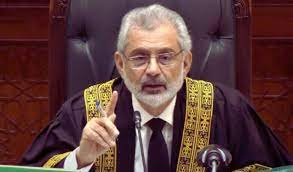Chief Justice of Pakistan (CJP) Qazi Faez Isa has declared that access to information is a constitutional right of every citizen, and it is not just a matter of discretion of the leaders, courts or adjudicators. Article 19A categorically mentions the people’s fundamental right of access to information. This clause gives unhindered rights to all citizens to get any information, and it is the primary duty of all government entities, whether federal or provincial to provide any information demanded. The Chief Justice further noted that the Supreme Court was also subject to Article 19A of the Constitution, hence all important cases were being broadcast live so that people understand and raise questions.
Access to information is a fundamental right of every citizen, it allows every individual access to government-held information relating to public work, governance, and important functions of the state institutions except sensitive matters relating to national defence, security, and foreign affairs. Historically, public access to government information is crucial because it promotes transparency, and enhances the accountability of public leaders, government servants, and institutions. At the same time, it prevents corruption, regulates governance, and enhances public participation in the decision/policy-making process in the country.
The government of Pakistan adopted Article 19A of the Constitution over two decades ago, while all federating units also reproduced those clauses in provincial legislative catalogues that confer citizens access to all information relating to public matters but those sane attractive promises and acclaimed legacies are only present on paper in sacred constitutional books whereas an altogether different and bitter situation exists in all institutions at all levels. Over the years, human rights activists, journalists, and researchers mostly received no or little response, twisted facts or blanket views from the government institutions rather the rulers and powerful bureaucracy became enemies of the journalists and rights activists when such information likely to expose corruption and misconduct of the ruling elite. Although, honourable judges, political leaders, and top bureaucrats sitting in high offices often make sane verdicts regarding people’s right to access government information but they never act on complaints or review statistics that shed light and expose the pathetic implementation of relevant clauses of the Constitution. In fact, all data relating to public affairs, development works, civil liberties, and the functioning of the government, to promote transparency and ensure public welfare at the optimum level.







